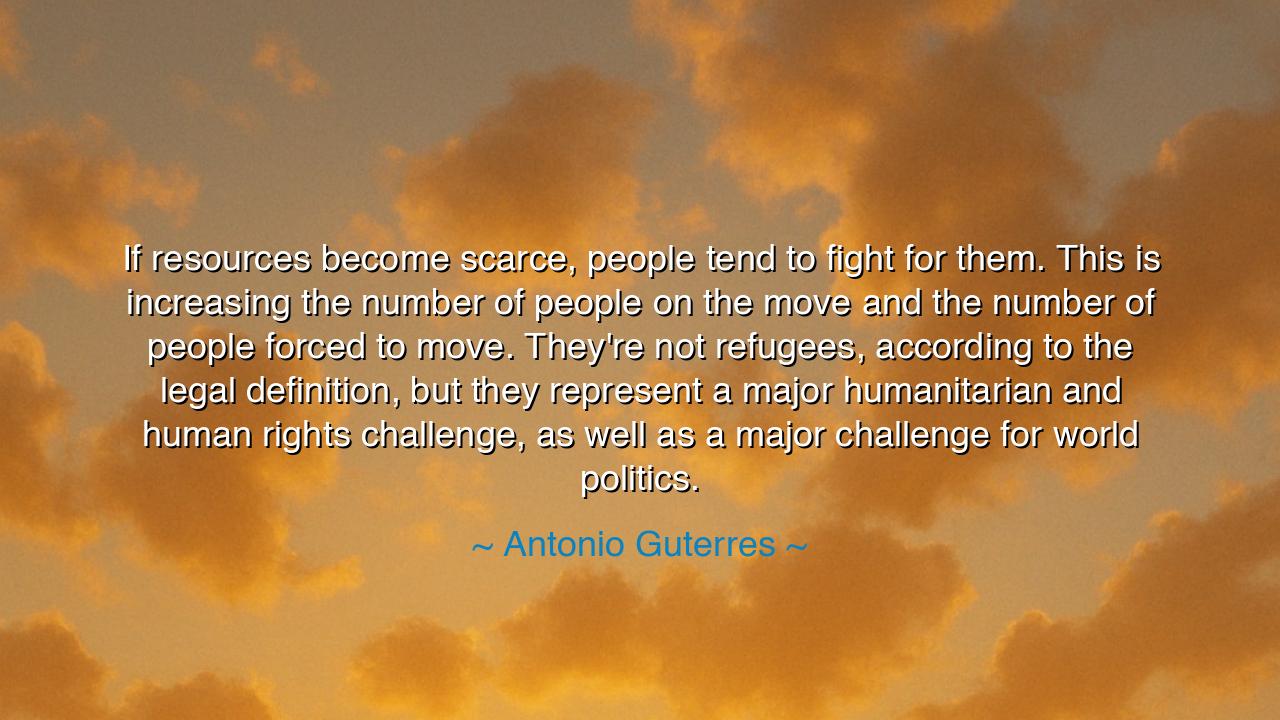
If resources become scarce, people tend to fight for them. This
If resources become scarce, people tend to fight for them. This is increasing the number of people on the move and the number of people forced to move. They're not refugees, according to the legal definition, but they represent a major humanitarian and human rights challenge, as well as a major challenge for world politics.






Hear the solemn words of Antonio Guterres, who has walked among nations as a steward of peace: “If resources become scarce, people tend to fight for them. This is increasing the number of people on the move and the number of people forced to move. They're not refugees, according to the legal definition, but they represent a major humanitarian and human rights challenge, as well as a major challenge for world politics.” These words are a warning, yet also a mirror, showing us the shadow that falls when human need collides with dwindling abundance. They are not words of comfort, but of urgency, calling all who listen to awaken before the storm grows heavier.
When Guterres speaks of scarce resources, he touches upon the oldest truth of mankind’s story. From the beginning of time, tribes fought for fertile land, rivers, and hunting grounds. The soil, the water, the air—these are the treasures upon which all life depends. And when they are plentiful, peace may flourish, but when they dwindle, even brother may turn against brother. The wars of old fought over kingdoms and crowns were, in truth, often wars over bread, water, and fire.
The phrase people on the move carries both sorrow and resilience. Across deserts, through seas, over mountains, countless souls wander not from desire, but from necessity. Their fields have dried, their wells have turned to dust, their homes have been swallowed by floods or flames. Though the law may not name them refugees, their plight is no less real, their suffering no less sharp. They embody a new chapter in the story of exile, one written not only by war or persecution, but by the very changing climate of the earth itself.
History offers us a striking lesson in the Dust Bowl of the 1930s. When drought and poor farming practices ravaged the lands of Oklahoma, Kansas, and beyond, millions of Americans were uprooted. Families packed their lives into broken cars and wagons, journeying westward in search of work and survival. They were not called refugees, yet they too were driven by scarcity, forced to wander in hope of sustenance. Their story is repeated now across the globe, in Africa, in Asia, in the islands of the Pacific—where the rising seas and dying soil drive whole peoples into motion.
Guterres reminds us that this is not merely a humanitarian crisis, but a political challenge. For when millions move, borders tremble, nations quarrel, and fear rises in the hearts of those who feel besieged by strangers. The question is not only how to feed and shelter the displaced, but how to preserve harmony among peoples, how to resist the temptations of hatred and division. If the world fails to see these wanderers as fellow humans, then the chaos of migration may spark yet greater fires of conflict.
The lesson is thus twofold: first, that the stewardship of resources is not an afterthought, but a sacred duty; and second, that compassion must guide the response to those who are driven to wander. To hoard, to exploit, to waste the earth’s gifts is to prepare the ground for conflict. To scorn the displaced, to deny them dignity, is to harden the world against itself. Only by balance and mercy may the nations avoid a future of endless strife.
Children of tomorrow, let these words settle deep in your hearts: live not as careless spenders of the earth’s bounty, but as careful guardians. Conserve water as though each drop were gold, protect the forests as though they were your own breath, and honor the soil as though it were the skin of your ancestors. And when you meet those who have been forced from their homes, greet them not with suspicion but with open hands, for they are living testimonies of a wound that belongs to all.
Thus the teaching endures: the scarcity of resources can breed violence, but the abundance of compassion can build peace. It is within our power to choose. Let us choose wisely, lest the world be swept away by tides of hunger and exile. For in the end, the earth belongs to no one and to all, and only in sharing its gifts can humanity endure.






AAdministratorAdministrator
Welcome, honored guests. Please leave a comment, we will respond soon